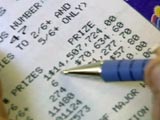A group of Vancouver fast food workers who are feuding over who should get a cut of a $14.5-million lottery win have been given until the end of the week to settle their dispute — or face a judge.
A senior official with the British Columbia Lottery Corporation said Wednesday that eight women and a man who work at the A&W burger restaurant in Mission, B.C., will definitely get a share of the prize from Saturday's Lotto 6-49 draw.
The question is whether two other women who work at the restaurant are entitled to a share of the winnings.
They have filed a complaint with the lottery corporation claiming they were also part of the pool.
Now the Corporation says it could ask a judge to settle the feud if it's not resolved during the next few days.
"One option we have is to pay it into a court and have the court decide, after hearing everyone's testimony, who are the rightful owners," said the BCLC's Jim Lightbody, vice president of gaming.
Lightbody says this kind of situation has never happened in B.C. before.
"Normally, all of these winners are able to work out their differences amongst themselves. And that's really what we hope happens in this case. We've given the parties a few days to think about it and hopefully they'll be able to decide amongst themselves," he told Canada AM.
"I'm not really convinced that they're going to be able to come up with a solution amongst themselves. So I think that there is going to be a court having to decide this for them."
Tanis McQuillan, 25, and Megan Weisgarber, 19, have retained Vancouver lawyer Patrick Lewis to represent them in their quest for some of the cash winnings.
"Stabbed in the back is how I feel," Tanis McQuillan told CTV News.

McQuillan claims she is entitled to a cut because both she and Weisgarber consistently put money into the weekly pool.
However neither of them have any paperwork to prove their claims.
McQuillan, who has worked at the restaurant for six years, told the Vancouver Sun she feels betrayed by people she considered her friends.
"They are people I've had in my house," she told the newspaper in a story published Wednesday. "They are people that come over for barbecues and for birthday parties."
Earlier this year, 81-year-old cancer survivor Robert Edmonds of Coboconk, Ont., sued the Ontario Lottery and Gaming Corp. for giving his prize money to the wrong people.
 He went to verify a ticket at a local convenience store and the clerk told him it was a loser. She and her husband then tried to cash it.
He went to verify a ticket at a local convenience store and the clerk told him it was a loser. She and her husband then tried to cash it.
The lottery corporation paid the couple the $250,000 winnings.
Edmonds sued and the lottery corporation spent more than $400,000 of taxpayers' money in a court battle before eventually settling with him.
Lightbody says there are ways to avoid such disputes.
 "Many of our players across Canada do play in groups and we actually think it's a great way to play Lotto 6-49.
"Many of our players across Canada do play in groups and we actually think it's a great way to play Lotto 6-49.
"What we would recommend is they just appoint one person to be the trustee and then go to our website and download a group agreement form and fill that out. That's what many of our players do and then it's very clear to everybody that when and if they do win, that all their interests will be taken care of."




Great work Todd on the pictures...adds character to the story.
This only proves that money changes people and circumstances.
Orangeman
This kind of thing is likely to happen with lottery pools that allows people to join off and on when ever they have some extra change or feel lucky. People who've contributed off and on for years will want to share the big money even if they didn't contribute anything the last time around.
A few year ago a Cleveland steel mill lottery pool that won the jackpot wanted to reduce the winnings for one of its new member because he had just joined a few months before they won and the rest of the pool members had contributed for years and won nothing. The court ruled he was entitled to an equal share and the fact that the others had played for years and won nothing before he joined had no effect on his share of the winnings.
There was also the case in Alabama where a guy gave Florida lottery tickets to waitresses in a local restaurant as tips thinking if any of the tickets ever turned out to be a big winner everyone would share equally including himself. One of the waitress won, quite her job and never even said "Thanks" to him and never shared any of it. The other workers wanted to go to court, but Alabama courts didn't recognize lotteries as legal and wouldn't hear the case. That story was on 60 minutes.
When it comes to sharing a lottery jackpot, friendships and the other drawings you contributed to doesn't count for much, it's what you did for the winning drawing that counts.
Make copies of the tickets and give all members a copy; or document the numbers by email (second choice). Friendship does not equal trust.
I have a feeling the two women contributed to some of the pools for past drawings and have no proof of contributing to the pool for the last drawing. In another article I read they also thought some of the other co-workers should also be included with the eight women and one man that claimed to have been the only members of the pool that bought the ticket. I think these women thought the pool was run by some of their co workers for the benefits of all the co-workers so they will have to go to court and convince a judge.
What I wonder is why someone would work at a fast food place for six years. No wonder she and her friend want a cut. No proof, no piece of the pie. Why wouldn't the others include these two if they are supposedly "friends" and supposedly entered in the pool?
"friends" were her words not those of the ticket holders. Being someone's friend, co-worker, relative or neighbor doesn't entitle her to a share of their lottery winnings. She'll have to prove she contributed to the cost of the tickets.
To many stories like this.
If these two could prove in court they put in the money but are being cutout I would file criminal charges against the others for being cutout.
I would never ever join a lottery pool. I will buy my own tickets and its all mine.
There are also those stories of people who have their own tickets and promised to share their winnings with their friends and communities and been sued when those friends or organizations in those communities feel they came up short on their promises.
What I wonder is why someone would work at a fast food place for six years. No wonder she and her friend want a cut. No proof, no piece of the pie. Why wouldn't the others include these two if they are supposedly "friends" and supposedly entered in the pool?
What I wonder is why someone would work at a fast food place for six years.
My impression's always been that they do it for the money. Ask a 12 year old kid what he wants to do when he's grown, he'll almost never say, "I'd like to spend my life flippin' hamburgers".
It's regretable these pools never seem to work out the way the members hoped. Seems to me a consortium of players could be a major plus if there were any means that could be devised to keep everyone honest. Ironclad contract and rules between the members, something, maybe, that's born just ahead of each draw and dies immediately after, maybe. Rises like a Phoenix from the ashes for the next draw so's there's no residual claim extant from participation in previous draws.
But even with that some human being would have to trust some other human being, which almost assures that the party of the first part will end up despising the party of the second part if there's a win. The two doing a courtroom opera of tears making some lawyer a happy man while the courts decide which of the two was incrementally more honest, than the other, deciding that neither was, but that one was more legal than the other.
A consortium of players who could trust one another through the streak of losing draws, however, would be good for everyone. Something they could do together, bring them close, help them develop trust in their co-workers. If there were only a way to assure they'd never get a win.
Jack